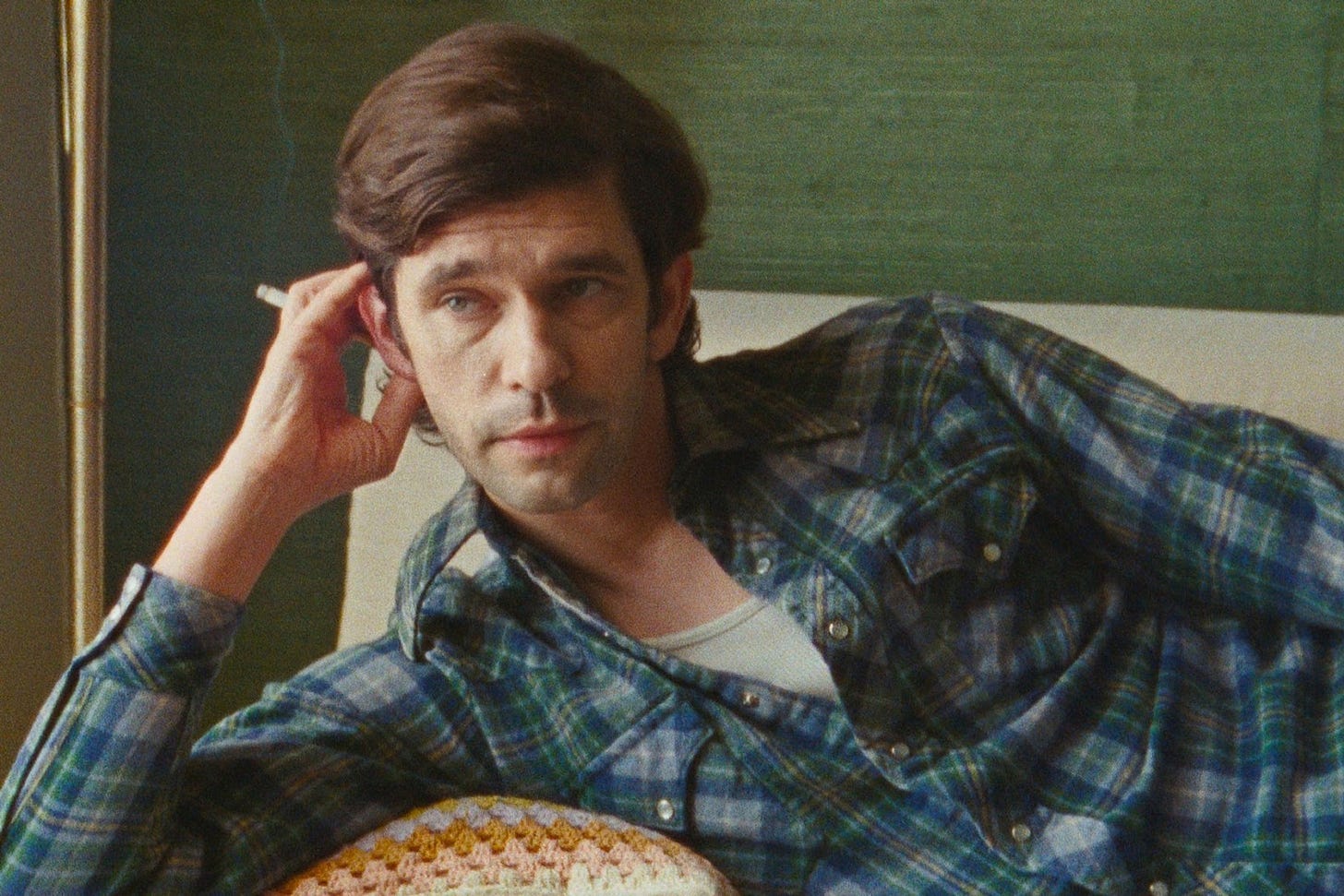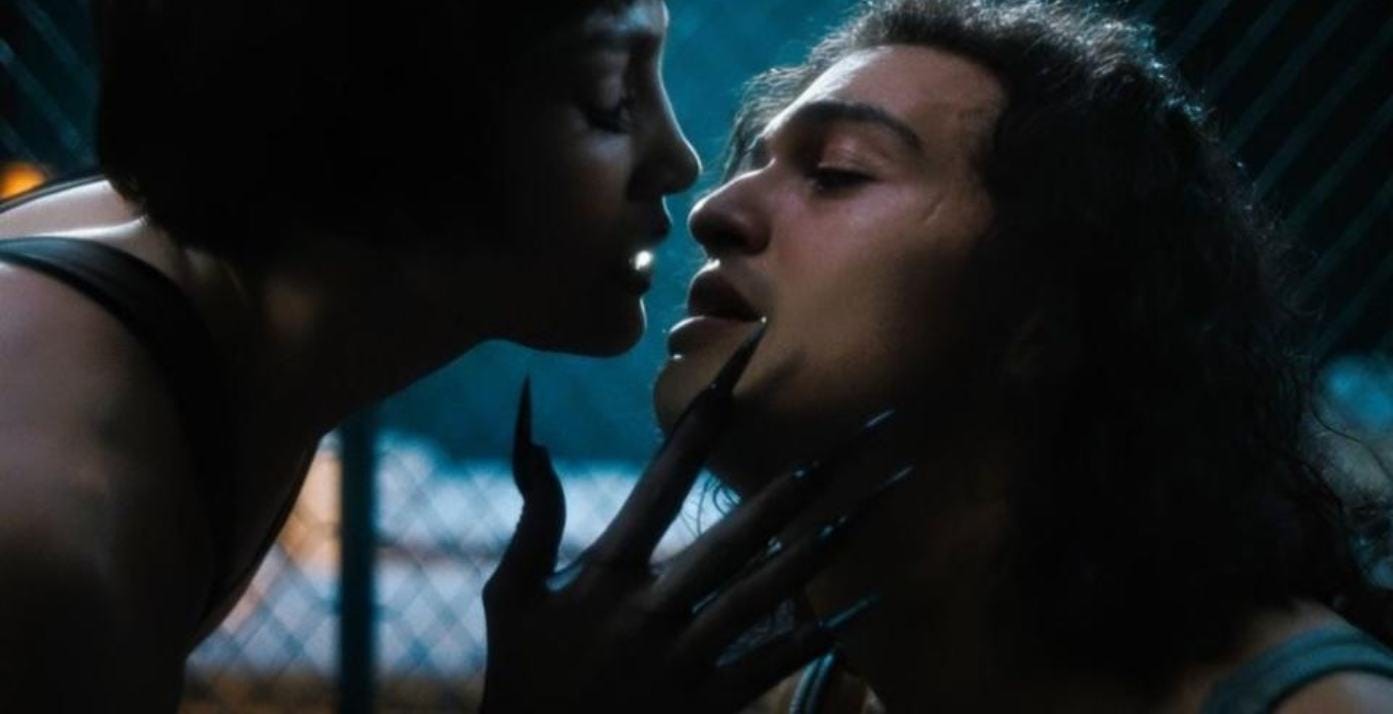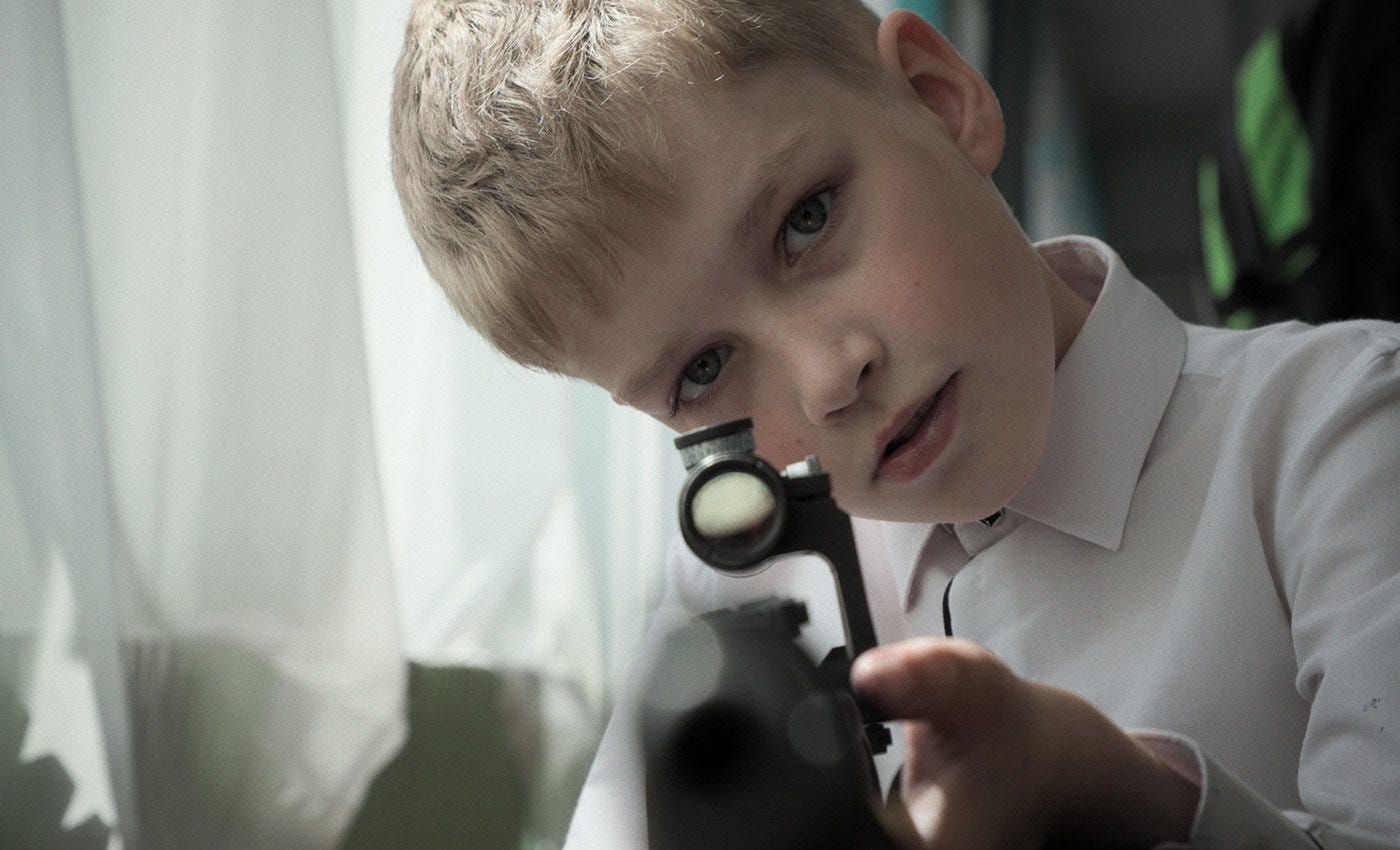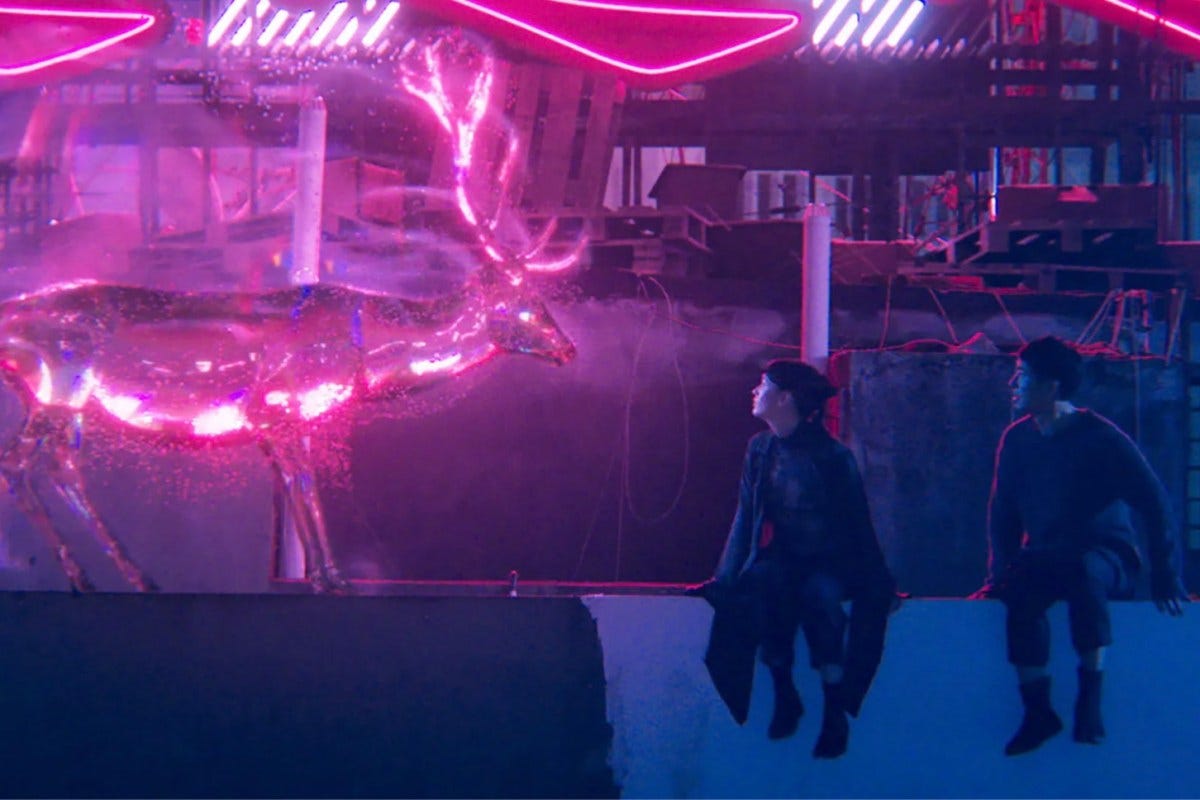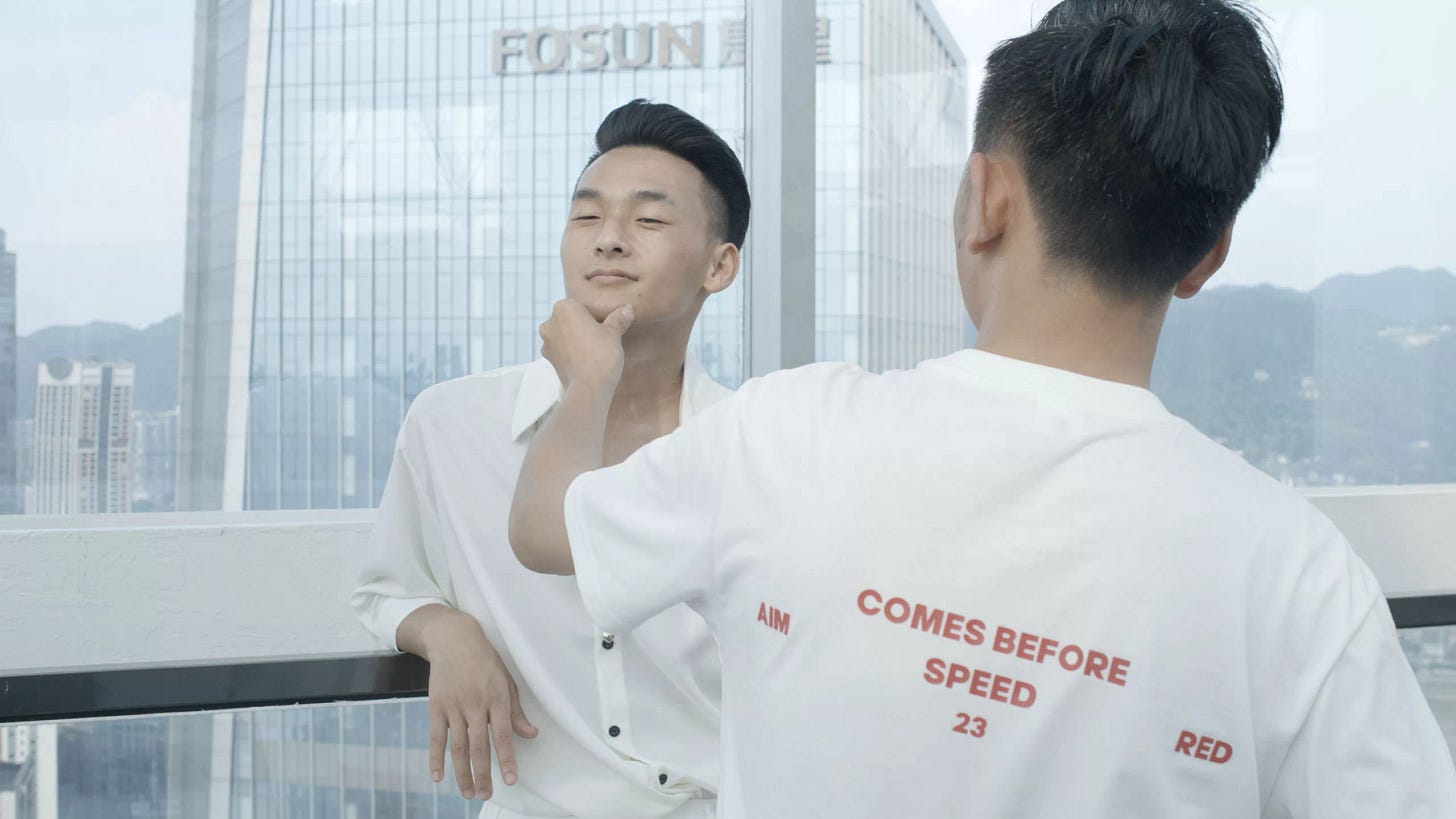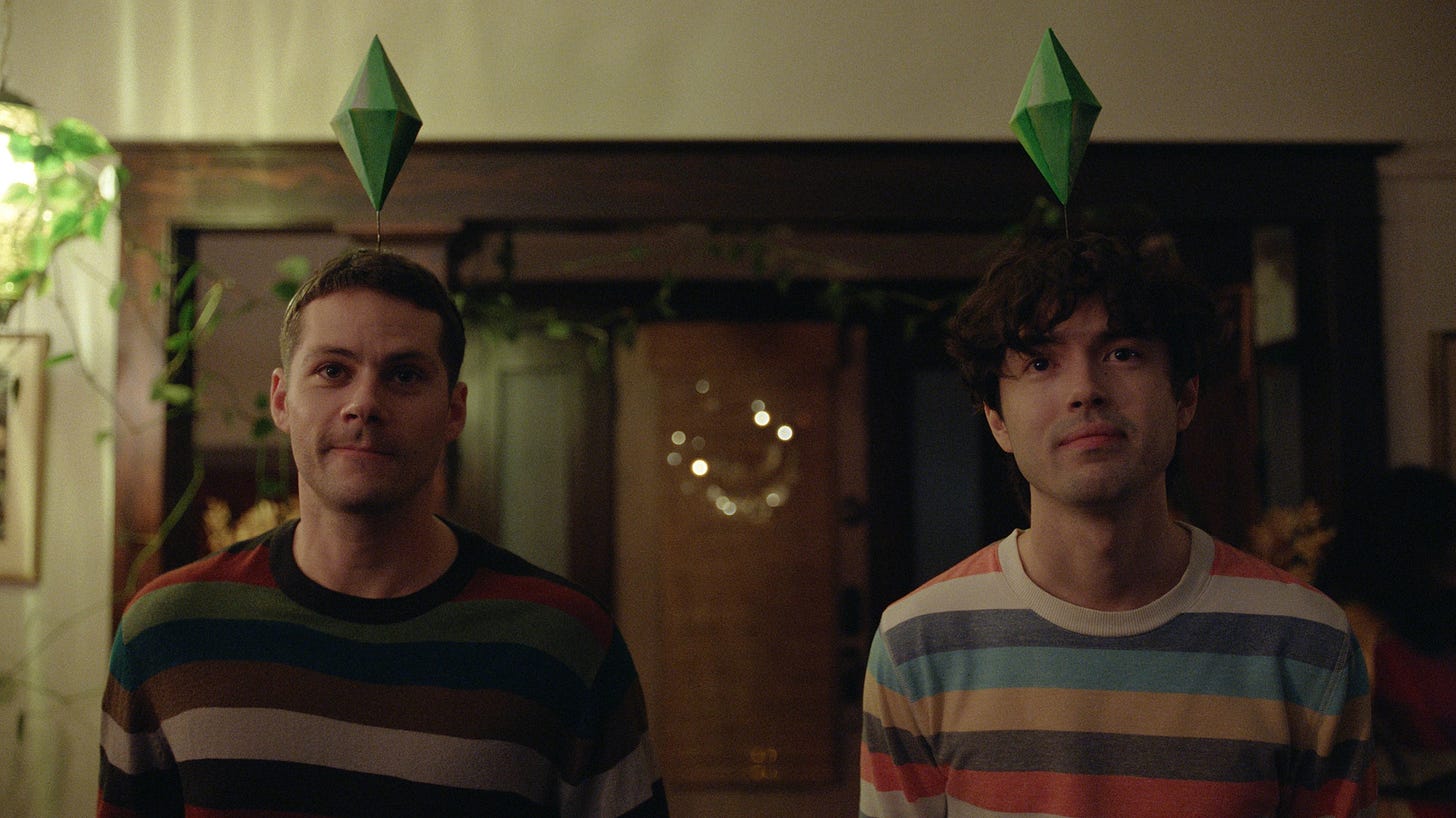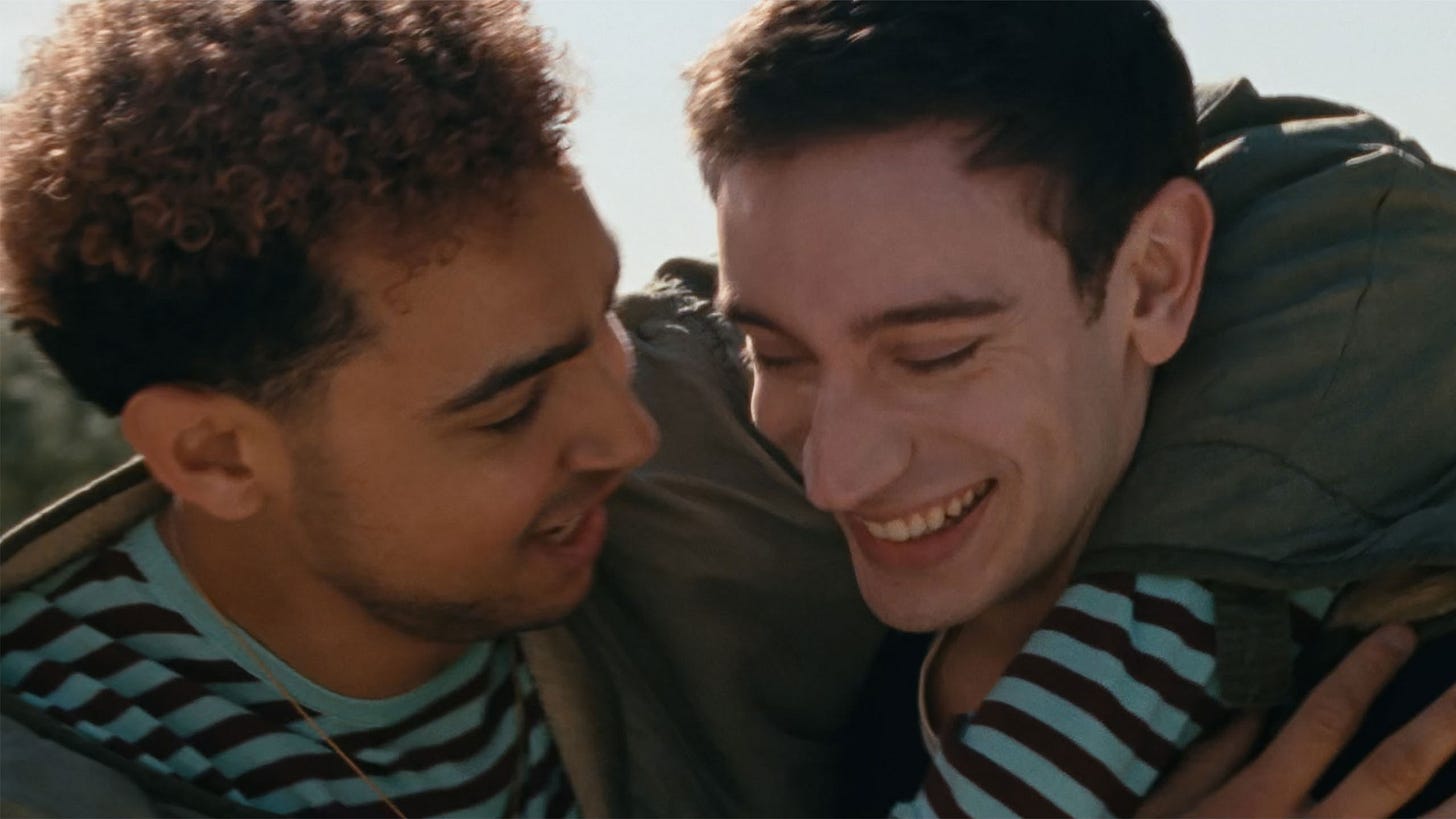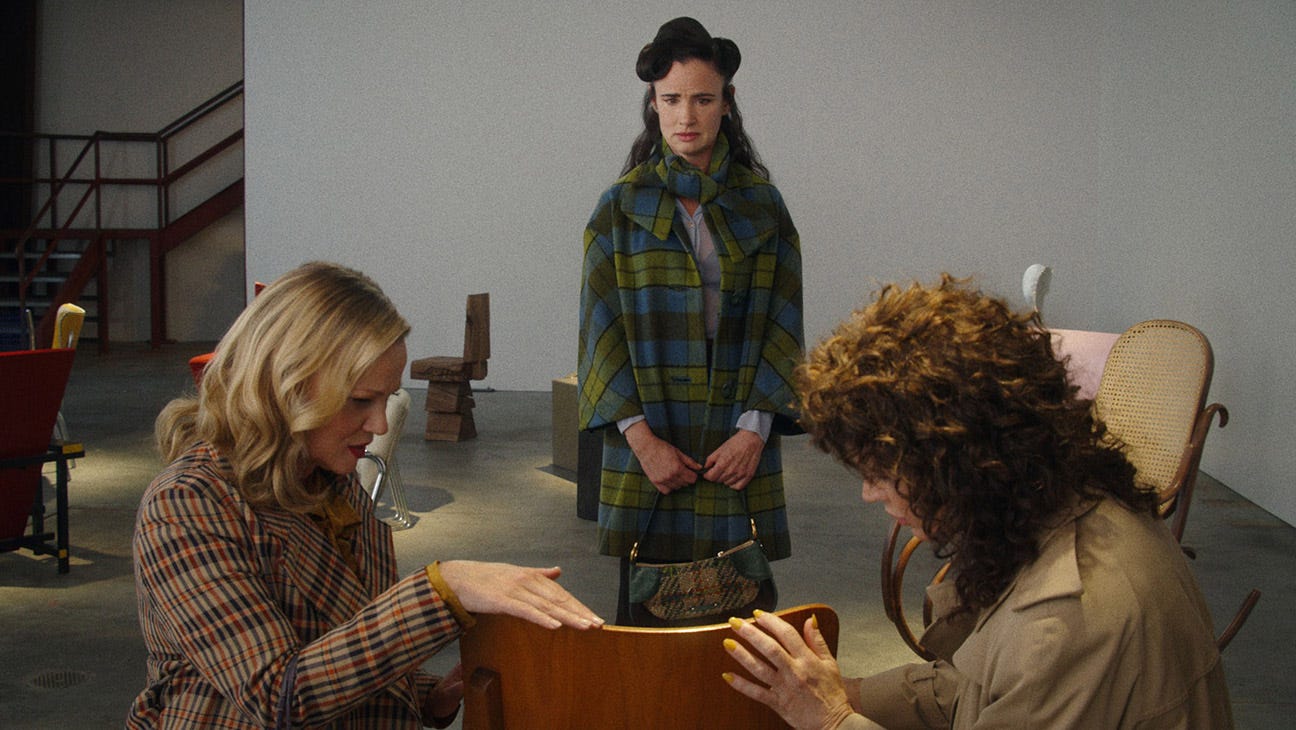Good afternoon, readers ☀️
Before we dive into this year’s ten ‘Best Picture’ Oscar nominees in our next serving of “Hot Tea,” let’s discuss some new tea so fresh it hasn’t even properly dried in the sun yet: the fifteen feature-length films I previewed during this year’s Sundance Film Festival. Though it may be some time yet before these films achieve mass distributions enough for you to screen them, let this serving of “Hot Tea” be a forward-looking anticipation of their eventual mass releases and an advanced guide of what worked and what didn’t in this year’s festival program.
Peter Hujar’s Day (2025)
Sundance • Dialogue • Deep intimacy
Synopsis
Noted New York City photographer Peter Hujar recounts one day in his life to friend and writer Linda Rosenkrantz in December 1974.
My take
Taking cues primarily from My Dinner with André (Malle [dir.], Shawn, & Gregory [wri.], 1981) and recreated documentary footage (à la docufiction at large), Peter Hujar’s Day is a surprisingly engaging exercise in historical reënactment, particularly conversation reënactment, wherein the viewer implicitly co-creates the imagery with the filmmakers by mentally digesting the words spoken by the characters on screen rather than explicitly receives the imagery directly from the screen itself. As the audience, we thus become the silent third partner in Peter’s real conversation with friend and writer Linda Rosenkrantz; and our retrospective knowledge of that conversation’s historicity quietly but constantly reïnforces the premise of all recording media, be they voice recording, image recording, or even just word recording as is the case here: namely, that their products are inescapably portals to the past, portals through which at the moments of their creation all possible futures of people (e.g., the recorders themselves later in life, their children, strangers across the globe, strangers across centuries) could eventually and perfectly access those exact experiences through the deliberate voluntary residue that are their records. It’s a delight that we now, as people fifty years since the recording of Hujar and Rosenkrantz’ original dialogue, get to taste that residue here, especially when the core of that dialogue is the bud of an interesting artistic idea in and of itself: how everydayness permeates our experiences but recedes so easily from our memories and our identities. Had Rosenkrantz ever finished her project, the single taste here would have made me extremely curious to sample the full menu.
Congratulations to both Rebecca Hall and Ben Whishaw, whose fascinating quiet chemistry here invites and ignites the material with hyper-present wondering; but special applause must go to Whishaw alone, who gives essentially a masterclass in line reading, monologuing, and character study in his seemingly effortless portrayal of Hujar.
Temperature check
Hot (but perhaps an acquired taste)
Kiss of the Spider Woman (2025)
Sundance • Musical • “A kiss of true love”
Synopsis
During the last months of the military dictatorship in Argentina, a romantic idealist is sent to gain the confidence of a key revolutionary figure in a sordid prison cell amidst torture from the regime.
My take
Impeccable beauty make-up and stellar costumes (from Colleen Atwood) cannot redeem Bill Condon’s latest big-budget musical adaptation from mediocrity. Serviceable in all other respects, the film lacks seduction. That’s the simplest way I can say it, readers: There’s just an utter lack of guile, without which the story — an investigation of secrets, private admissions, intrigue, and passion — remains without mystery and, without mystery, without interest. Style, attention-grabbing choreography, and (melo)drama abound, yes, even with camp jokes to entertain the audience between traumatic scenes; but everything remains right at the surface level, so that one never has to wonder what any character may be thinking or considering, because it’s always clear and it’s always explained. Seduction never works on an audience that knows with perfect clarity it’s supposed to be seduced.
While ultimately the responsibility for this tonal failure lies squarely on writer and director Bill Condon’s shoulders, disappointingly complicit with his errors is Jennifer López, whose on-screen appearance of emotional inexperience may have been perfect for her greatest and most popular cinematic performances (viz., the title role in Nava’s [1997] Selena, the title character in Wang [dir.] & Wade’s [wri., 2002] Maid in Manhattan) but are entirely inappropriate for this role, whose profound wisdom and knowing inevitability must pervade, entice, and frighten the other characters and in turn the audience. López is never truly frightening and only weakly enticing. Her best moments arise in her dancing only, wherein she proves she still has the moves to impress an audience in at least one way. Those moves alone, however, are hardly likely to get her where she so clearly wants to be: among the nominees for Best Actress at the 2026 Academy Awards. It may have been genius to cast her; like Condon, I’m sure, I too would have believed that she, if anyone, could live large within Chita Rivera’s legacy when taking this musical once again from stage to screen. Yet, ultimately, that casting was a gamble that proved not to pay out; and perhaps Condon too was disappointed.
Still, for all its suboptimal characteristics, at the end of the day this musical remains a classic entertainment. For those who don’t know it, the winner of seven Tony Awards including Best Musical, Best Book for Terrence McNally’s adapting of the novel, and Best Original Score for Broadway legends John Kander and Fred Ebb, the spectacle itself may yet be worth the price of admission.
Temperature check
Tepid
The Things You Kill (2025)
Sundance • Thriller • Would That I Could
Synopsis
An impatient professor takes the suspicious death of his disabled mother into his own hands, for better or worse.
My take
Confusion instead of bite is the hazard of this on-paper thriller from Iranian writer and director Alireza Khatami, whose preöccupation with and self-indulgence into narrative surrealism in this film even extends to the names of his two primary characters. Ali and Reza are complementary, in more ways than one, here; and that complementarity is the entire conceit of the plot. Were it the first time such a conceit were explored on film, what an inventive and destabilizing take the choice to feature it would have been. However, after everything from Dr. Jekyll ad Mr. Hyde (Mamoulian [dir.], Hoffenstein, & Heath [wri.], 1931) to Life of Pi (Lee [dir.] & Magee [wri.], 2012), a cinematic investigation of the duality of man must bring something dynamically new to the table, lest it be just another line in the increasingly long inventory of works in which latent often base desires emerge to seize control of a protagonist’s destiny, be that seizure to that character’s obvious benefit or cost.
What’s markedly worse about this particular film, however, is that the surreal transformation the protagonist undergoes in order to unleash his alternate self is only vanishingly visually distinct from the other action in the film. An introduction in a small, cracked mirror and a few scant textual references to, other than the apparent symmetries in their personal histories, the alt self’s blank slate past are all the film supplies to indicate that an exchange is not only possible but moreover active. Without a close reading of those fleeting moments, the visually paradigmatic shift the film undergoes as it itself transitions into its second act can easily feel like a fabular blindside, suddenly and inexplicably swapping out one identity for another. Perhaps Khatami hoped that the change would read as sudden and overwhelming to the audience as it felt to the character himself, taken over by his passions in moments of profound vulnerability in order to find and portray strength. Being generous to him, I’ll hope that was the intent. Regardless, the effect of its materialization on film here is at best a jolt, at worst a confusion, for the viewer.
Ultimately, Khatami’s film isn’t unsuccessful; satisfactory performances and the revenge narrative itself motivate attention and interest at least enough to respect the attempt, and fortunately the breathtaking sweeping views of the complex topography of the Turkish countryside skillfully expand the game and relieve the internal pressure of the dense domestic drama at the heart of the plot. However, there are so many other films (e.g., Life of Pi, Interview with the Vampire [Jordan (dir.) & Rice (wri.), 1994], No Country for Old Men [Coen & Coen, 2007], The Seed of the Sacred Fig [Rasoulof, 2024]) that tackle and integrate their tropes and their plots more successfully than this one, that it’s hard to recommend you take a look here rather than there.
Temperature check
Cold
Mr. Nobody against Putin (2025)
Sundance • Documentary • Teach
Synopsis
In Karabash, Russia, a primary school teacher records and reflects on the local impact of the absolutists’ martial regime onto his young students, their families, and their futures.
My take
As is so often the case, it takes a native outsider, an observer from the same community as his subjects but not as intricately woven into their self-sustaining fabric, to have both the personal intimacy and the editorial distance to understand and to scrutinize a frayed social structure. Here, in his documentary brought to life by David Borenstein, Pavel “Pasha” Talankin is that native outsider, risking his own personal safety in order to describe and comment on the wintry sociopolitical climate of at least one relatively small town in Russia prior to and during the 2022 escalation in the Russo-Ukranian War. The result is an inimitable and private confession of wariness, disbelief, optimism, and fear from beyond the effective firewall otherwise blocking the authentic communication of the everyday Russian people with the outside world.
Unguardedly half-hearted recitations of state-issued disinformation and propaganda, curious and proud pro-militarizations of small children (see the image above), and admittedly compliantly nationalistic parades of service and support betray a society uncertainly bending far from its otherwise locally content and familiarly provincial life under the thumb of a self-righteous autocracy, whose leader’s own private and internationally competitive interests have deliberately coöpted the authentic cares and spirit of the people in order to control and compel their futures. By design, Talankin is right to recognize, the children whose futures are most at stake in this war over not just geographical but also intellectual territory are, painfully, the least prepared to represent any alternative. Accepting their conscriptions as calls to brave adventure rather than as, perhaps, deadly usurpations into their state’s on-going attempt at seizing land from another country, even the oldest among the children only dimly appreciate the system their barely adult lives are already being asked to uphold; and that normalized acculturation to a non-disputatious if aggrieved relationship to the currents shaping their every opportunity and setback becomes the dominant anesthesis to change only the native outsider’s lens can both witness and provoke with any sincere influence.
Fortunately for Talankin, his extradition from the danger that that provocation would inevitably bring was a necessary pre-condition of his film-making partners’ work with him throughout the project; but it’s more than evident from his passionate valedictory address to his school’s graduating class, that such permanent outsidership, entailing the relinquishment of his ability to directly influence, comfort, or educate, is only barely the necessary preference he must embrace in order that his work and his community’s example be a document and a resource for others who may then feel similarly charged to act.
Temperature check
Hot
LUZ (2025)
Sundance • Drama • Liminal space
Synopsis
An immersive virtual reality liberates the frustrated desires to connect of an artist, a gallerist, a “cam girl,” and a henchman.
My take
Tonally most similar to an episodic political thriller like The Night Agent (Ryan [creator], 2023-present) or House of Cards (Willimon [creator], 2013-2018), Flora Lau’s LUZ set ups and eventually links two parallel narratives about separation and reconnection for two parent-child pairs.
In one pair, Oscar nominee and Rich Pick Isabelle Huppert is the medically precarious Parisian artist who lives for the moment despite her estranged Chinese step-daughter’s persistent urgings to slow down and seek further treatment following a recent hospitalization.
In the other, Golden Rooster nominee Xiaodong Guo is the ethically dubious strongman searching for his own estranged daughter in the streets of Chongqing and in the worlds of her favorite virtual reality game, LUZ.
Connecting when the two storylines happen to meet in that virtual environment, where the common goal is to successfully track and hunt an elusive mythical deer, the artist’s step-daughter and the strongman form an unlikely bond in their similar quests for personal consolation and meaning, which — spoiler alert — they admittedly both fail to find regardless of where they happen to look.
I’ve presented the above, loose descriptions of the overall plot to you, readers, not as a blunt synopsis of the film per se but as a context for understanding its good and its bad properly. With roots in art and explicit pretexts for virtual interactions, LUZ prepares and provides for many colorful opportunities for surrealistic imagery to take over the screen and wash away the naturalistic constraints of the “real” plot’s environment. These opportunities supplant that “real” environment with a liminal environment, often a literal forest, akin to the literal and liminal forests protagonists in fairy tales and fantasies regularly pass through on their own quests for achievement, happiness, and/or fulfillment. In that space, wherein tethers to everyday realities may be extraneous if not outright counterproductive to the development of the dramatic narrative, the film allows itself to treat and explore heavy questions freely: questions of obligation, questions of devotion, questions of mortality, and questions of connection, real or imagined. This free exploration expands, when Lau further allows the border between worlds to blur (e.g., when the artist and her step-daughter frolic in the uncertainty of the rough surf, the camera lens repeatedly awash with the brine of that intermediacy between being grounded and being lost at sea). There, in those curated and indecisively located scenes, the film achieves its best moments, connecting Huppert’s once frosty Sabine with her curious stepdaughter in vulnerability, in the space between her life and her death, and connecting Xiaodong’s strongman Wei with his “cam girl” daughter in a reconciliation over their otherwise independent lives.
Unfortunately, this strength in visual and virtual metaphor is squandered on relatively low stakes whereby, moreover, near plotholes linger on the peripheries. Characters overdramatize the interpersonal challenges they face and act as if unquestionably compelled along the paths of action they take, as if no reasonable alternatives did or ever could exist. Wei for example, upon being blocked from accessing his daughter’s cam channel, inexplicably leaps into the “needle in a haystack” quest of finding her avatar in one of the 300 virtual worlds in LUZ rather than simply creates a new cam-viewing account. Similarly, stepdaughter and gallerist Ren, after receiving the new of her estranged step-mother’s recent medical episode, abruptly flies directly to Paris rather than writes or calls Sabine first. While neither character’s reaction is implausible, it’s still playing far too loosely with the material realities of the plot, to just entirely elide the authentically likely considerations real people in the same circumstances would naturally have in favor of merely stylistic priorities over how that plot will play out. Unsurprisingly then, a ready suspension of disbelief is required in order to enjoy rather than be estranged from the qualities of this film.
Ultimately, a rather nostalgic if still futuristic exploration of interpersonal pasts once thought lost but now possibly regained, LUZ like the hybrid child of Celine Song’s (2023) Past Lives and Alex Garland’s (2018) Annihilation is at best sentimental comfort viewing with a neon glaze for anyone in the mood to contemplate one’s own potential relationships.
Temperature check
Tepid
Sabar Bonda (Cactus Pears; 2025)
Sundance • Romance • Choosing for Oneself
Synopsis
During the ten-day funeral ritual for his father in their rural hometown, a Mumbai-based man reconnects with a childhood friend now dairy farmer who has also refused his family’s pressure to marry.
My take
“Unmarried men” is arguably a new category of marginalization explored in the Indian cinematic canon. In South Asia it is typically the girl child who represents the burden for her family, be it via the vice of dowry, the curse of being lower caste, or the tainted blessing of education. “Sabar Bonda” is commendable in how it demonstrates the unique silent pains borne by many queer men who, despite their male privilege, have to fight to remain unattached (same sex marriage is illegal in India), to not be infantilized, and to realize relationships longer lasting than quick clandestine sex.
-Ritesh Mehra for Indiewire (26 January 2025)
On paper a downbeat Indian Mambo Italiano (Gaudreault [dir./wri.] & Galluccio [wri.], 2003), wherein meddlesome family members confuse others and themselves with matchmaking pressures on two largely closeted gay men, Sabar Bonda (Cactus Pears) is an unexpectedly sensitive and tranquil exploration of budding romance between two adults whose authentic selves place themselves outside their cultures’ boundaries between the known and therefore licit and the unknown and therefore illicit. Patiently blooming while we listen to the diegetic sounds of trees and reeds rustling in the breeze, crickets chirping, or funeral bells chiming in the background, the pair’s romantic connection is, poetically, the benevolent resurrection of the protagonist’s beloved but now passed father’s spirit. In the film’s most powerful scene, protagonist Anand receives his father’s previously questioned affection and understanding in an experienced, if imagined, inheritance ceremony, passing not only status as revered patriarch from deceased father to only (living) son but also awareness and support of that son’s affections from unknown and illicit to known and licit within their shared community and culture. It’s classic queer cinema at its most delicate, and it’s a quiet pleasure to see. Framed beautifully within interiors and exteriors that expand with the plot and naturally lit often seemingly with just sunlight, Sabar Bonda in title, in text, and in its visuals honors and rejoices in the gentle truths of nature, human and otherwise.
Temperature check
Tepid
Speak (2025)
Sundance • Documentary • Conviction
Synopsis
Adolescent national oratory competitors each prepare for their ten minutes on stage.
My take
Cultural sibling to Pianoforte (Piątek, 2023), which I also had the pleasure of watching at Sundance, Speak is another entry in the emerging sub-subgenre of documentary film focussed specifically on the pressurized lives of elite young competitors notably outside athletics. Here the competition is the national one in original oratory, wherein each speaker composes and presents a ten-minute argument on a topic usually of personal import. Control, clarity, and convincingness are all crucial in that presentation; and each speaker works rigorously on the micro-inflections and transitions that will help shape and hopefully land solid acoustical and argumentative impressions in the minds of the judges. Obsession and devastation are therefore necessary by-products, sufficient and varied in supply enough to fascinate any audience curious enough to peer over the wall and into this niche world of rehearsal, staging, and coveted achievement, wherein a speaker’s expectations alone are enough to fuel emotional highs and lows with tears at both ends.
The problem with Speak is that it doesn’t really seem to know what to do with this ripe situation. Ultimately reading more like an extended episode of MTV’s True Life (1998-2017) than like an insightful examination of teenagers in flagrante studiō, Speak takes the most pedestrian route through its tourist-friendly domain and does little to explore the emergent qualities even simply being so often in competition evokes from within the six teenagers in focus. Perhaps it was the filmmaker’s intent or decision to try to avoid caricaturing these teens into simulacra of themselves, individuals fixed immovably on only the competition rather than people living fuller lives around the competition; but without a through-line to at least bind the characters by more than simply circumstance, the final film ends up more like a sequence of loosely related portraits than like a coherent film. As was not the case with Pianoforte, I’d recommend you readers seek that one out before stopping here and watching Speak.
Temperature check
Cold
The Dating Game (2025)
Sundance • Documentary • Fish in the Sea
Synopsis
Single and looking twenty- and thirty-something men contend with a dating scene skewed heavily out of their favor due to the generational impact of China’s former “One Child Only” policy.
My take
The most interesting parts of The Dating Game aren’t the fairly toxic coaching sessions that desperate young men have paid to hear, nor are they the make-over montages transforming those young men at least visually from their awkward but authentic selves into relatively fashionable, posing doppelgängers; no, the most interesting parts are actually the historical edits that contextualize those present-day activities within the social and political history of China as a country and a culture.
From the nation’s rapid urbanization at the end of the twentieth century
to the consequential departure of many rural children’s parents to the new cities for work
to the emotionally traumatic abandonment those children experienced being left to be raised often by grandparents or other extended family who remained in the countryside
to finally the present situation of these children, now mostly young men who haven’t learned how to socialize themselves as eligible bachelors (and perhaps may not even want to), while their parents meet weekly in public parks that have become matchmaking marketplaces for hopeful grandparents,
it’s the back-history of the subjects of the documentary that makes the philosophical debate of the two matchmakers in focus, one coaching men and the other women and the pair together a romantic couple in their own right, so compelling, because it’s only within the context of that history that their opposing philosophies, informed by the realities of their individual experiences, project the greater debate happening not just within China but also within any modern society caught between the social construction of attraction and the interpersonal reality of a bond. Essentially, is it better for me and therefore for society to admit the constructibility of attraction and semi-openly play into it (e.g., by staging photos, by allowing Cyranos, by trying to dazzle), or is it better to admit only the interpersonal reality of bonding with another person over substantive points of connection (e.g., in shared values, in shared goals, in shared personal experiences)? Which if either will lead to the better match, or the happier couple? Which if either will bring me what I want? For young people who believe that “building a family is a crucial experience, crucial to building a harmonious society,” the answer is decidedly unclear and in that ambiguity is where the modern fertility ritual and this documentary flourishes.
Temperature check
Hot (for its novelty)
Twinless (2025)
Sundance • Comedy • Janus
Synopsis
In a support group for adults who have lost their twins, a recently bereft man befriends a sardonic office worker.
My take
By far the best comedy at this year’s festival, James Sweeney’s Twinless continues the actor, director, and writer’s mutinously verbose, dryly funny, queer style — this time wisely in the context of a ‘straight man,’ whose own exaggeratedly narrow and guileless literalism becomes the prime comedic friction against which that style must rub. This context advances Sweeney’s work beyond its fresh introduction in his feature début, Straight Up (2019), wherein it bounced energetically around its own echo chamber, and broadens the perspective’s inherent appeal beyond the niche nearly autistic and/or explicitly queer audience that naturally shares it. In this effort, Dylan o’Brien happens to be the perfect partner for Sweeney, o’Brien’s naturally dressed-down, reluctant, yet confident undertones mapping cleanly and directly to Sweeney’s dressed-up, temerarious, yet insecure overtones. The visual (see the image above) and narrative frisson that results from their interactions is the clever, sensitive, and at times brutal lifeblood of this new film, and o’Brien’s performance especially pumps this blood with an empathetic honesty and a demonstrated dynamism that not only show the actor’s growth since even last Sundance’s Ponyboi (Arango [dir.] & Gallo [wri.], 2024; see my take here) but moreover merit the actor more than a few good words when the film eventually premieres to the public. To those thirsty fiends whose piracies nearly led to my missing the film, I promise, your attention is entirely misplaced. Well done, Mr. o’Brien, and well done, Mr. Sweeney. Your willingness to twist and be twisted on the page and on the screen was a welcome highlight this year.
Twinless won the U.S. Dramatic Audience Award and the U.S. Dramatic Special Jury Award for Acting (for Dylan o’Brien’s performance specifically) at this year’s festival.
Temperature check
Hot
Jimpa (2025)
Sundance • Drama • Autobiographilia
Synopsis
The conflict-averse daughter of an aging, mercurial LGBTQ+ activist takes her family overseas to spend time with him, while she’s working on a film about his life.
My take
Self-indulgent if tender, Sophie Hyde’s apparently autobiographical Jimpa is the exact sort of hagiographical, familial navel-gazing that indulgently comforts everyone in the subject’s inner circle but otherwise, like a stranger’s baby’s photos foisted upon you in line at the grocery store or at an airport gate, strains polite affections in all but the most leniently gregarious and empathetic viewers. Working in the tradition of Mike Mill’s (2011) Beginners, which earned Christopher Plummer his Oscar, and Andrew Durham’s (2023) Fairyland, which also premiered at Sundance, Jimpa puts intergenerational family dynamics at its forefront and waffles on whether conservative if venturesome perspectives offer more substantial value than liberal if untested beliefs. Outside John Lithgow’s captivating performance, which if campaigned in the Supporting Actor race could put up quite the competition, this intergenerational debate over the best socio-political North Star (backgrounded and only semi-serious though it may be) is the point of greatest interest in the film, which otherwise seems content with stroking its own idiosyncratic melodrama. This melodrama will earn the film a slot on every sentimental (if liberal) audience’s end-of-year “Best” list, but otherwise makes for a quite missable feature, despite even Olivia Colman’s inimitable charm. If only the film had chosen to liberate itself from the bonds of personal fidelity to the people on whom its characters are based, then perhaps it would have found a better distillation of the emotional and philosophical themes it intended on exploring.
Temperature check
Tepid
Lurker (2025)
Sundance • Drama • Infiltration
Synopsis
An obsessive clerk inveigles an up-and-coming singer into taking him under his wing.
My take
In the wake of:
The Talented Mr, Ripley (Minghella, 1999),
The Social Network (Fincher [dir.] & Sorkin [wri.], 2010),
Notes on a Scandal (Eyre [dir.] & Marber [wri.], 2006),
Fatal Attraction (Lyne [dir.] & Dearden [wri.], 1987), and
all their own antecedents,
a new film about an insidious outsider worming his sycophantic and insufferable way into the life of a glamorous third-party, I’m sure, was on no one’s request list. It’s been done, and done quite well in most of those cases; what more could there be to freshen up that niche dramatic sub-subgenre anyway? So, when Lurker opened its story and began listing in that direction, my first instinct, I’m not afraid to say, was, “O, no! Not another one of these! It’ll most probably fall flat, repeat tropes, and/or at best mimic the qualities of its cultural ancestors.” But, it both angers and delights me to say, readers, Lurker is anything but mimicry. Finding rich deposits of new in what was thought to be fully excavated land and twisting the hand of the audience hard to mine those deposits with complicity, the film is almost a masterpiece of auteurship, editing, and original storytelling. It pushes past all the expectations one might bring to it out of familiarity with the stories that have come before and insists that the viewer look again, look closer, and reëvaluate its own prior prejudices in light of the events it carefully and precisely parades before our eyes. I was utterly impressed. The best film I have seen in over a year, director and writer Alex Russell, an Emmy winner for producing Beef (Lee [creator], 2023; see my take here), should be enormously proud of his accomplishment, kiss his editor, and thank his magnificent actors, especially Théodore Pellerin in lead and Archie Madekwe in support, for their tremendous application to the unflinching honesty and sincere affection he carved out of stone for them to embody. Bravissimo! I haven’t felt so sweaty in the cinema since Parasite (Bong [dir./wri.] & Han [wri.], 2019).
Temperature check
Steaming
Ricky (2025)
Sundance • Drama • Recidivism
Synopsis
A staunch parole officer tries to help a young Black man successfully reïntegrate into society after 15 years in prison.
My take
Sheryl lee Ralph’s performance as the staunch but empowering police officer in charge of the titular character’s parole is perhaps the one redeeming feature of this otherwise procedural and frankly dull drama about a man’s struggle to reïntegrate into society after being imprisoned as a teenager. Despite a clearly earnest screenplay dedicated to reïnforcing the cultural knowledge that systematic challenges complicate avoiding recidivism and finding personal and professional success after years in prison, the film smacks of tonal inauthenticity in the lack of chemistry between many actors and in the emotionally perfunctory performance of its lead, playing the title role. Never did I feel gripped or moved by the drama on screen, and that absence of connection for a film so clearly about empathy is the worst failure it could have had.
Temperature check
Cold (numbingly so)
The Wedding Banquet (2025)
Sundance • Comedy • Reünion
Synopsis
The secretly gay scion of a Korean family proposes marriage to his lesbian Chinese American friend, so that he may remain in the U.S. outside his familial obligations.
My take
Speaking with writer and director Andrew Ahn after the screening of this new film, I asked quite directly how he and his co-writer, James Schamus, who had also co-written the original 1993 classic (Lee [dir./wri.], Peng, & Schamus [wri.]), had settled upon the uneven distribution of responsibility-taking vs. -avoiding among the characters in the new story. Unlike the characters in that original, who all fairly evenly traded around any contention with responsibility as if it were a hot potato they each knew how to peel or cool in only one specific way, the characters in this new version of The Wedding Banquet almost all seemed abjectly refusing of even the smallest dint of responsibility, all except one. From his answer, a roving description of how Lily Gladstone came to involved in the project, he ultimately suggested that the shapes of the characters were ultimately undecided until the actors arrived to finish carving them out; Gladstone’s stable and reässuring Lee only became that Lee, because of what Gladstone herself brought to the table, for example. While this revelation earned Gladstone greater respect in my book for opting into playing the ‘straight man’ among the otherwise zany personalities Ahn and Schamus clearly had thought their reïmagined comedy of errors would need, Ahn’s otherwise leaving the cast lopsided and relatively aversive (even if recognizable) discredited his overall process for filmmaking in my book. He simply underbaked this screenplay — a crime against the revered memory he and I share of Ang Lee’s classic — and let a group of variously talented comic actors vie with each other openly for focus and screen time. Not only did this diegetic competition nearly ruin the heart of the story, but it left many sharp turns in the plot feeling incoherent to the audience, who otherwise could have bought a decidedly non-linear series of events as the high-stakes, high-comedy drama it was clearly meant to be.
Only Youn Yuh-jung, Oscar winner and Rich Pick nominee for her brilliant supporting work in Lee Isaac Chung’s (2020) Minari, in her infinite expertise and wisdom brought a centering, stabilizing force to the film. Her sensitive additions to the plot and her note-perfect interpretations of her character added yet another sensational supporting performance to her résumé, and I hope that come year end she’ll be recognized again (at least in the nominations) for that achievement.
No, this new The Wedding Banquet isn’t without its laughs or its charms, but as a film overall it’s another oddly messy attempt at bold queer Asian American cinema from Andrew Ahn, whose true talents after his very strong début, Spa Night (2016), I’m sadly starting to doubt.
Temperature check
Cold
By Design (2025)
Sundance • Comedy • Dadaesque
Synopsis
A lonely woman finds new life in the body of a chair, later owned by an underappreciated but sensual piano player.
My take
Had Amanda Kramer’s unapologetically off-beat By Design limited itself to a short film concentrated around its first ~10 minutes, I’d be among the first to applaud what a bold and fresh take on desire and possession the film would be. Ironic, absurdistic, and playfully discontent, By Design would be the cultural cousin of Julio Torres’ Problemista (2023) and Fantasmas (2024; see my take here).
Unfortunately, By Design kept going. Trudging through another hour plus of bizarre often literally lifeless content, the film lost its audience and nearly its entire narrative thread to the dismaying confusion that nothing more would or could really happen in its plot. I mean, sure, ironic moments, self-indulgently “poignant” in their crafted criticisms of narratives around superficialities, real connections, and victimhood, happen; and, yes, the audience can clearly understand that the motivating core of the film remains always about how very few people may ever notice the background characters in the dramas that are their own lives; but points already taken very clearly very early on. For a film with so many inventive visual and narrative conceits, why only the one thing to say over and over again?
Temperature check
Frigid
Plainclothes (2025)
Sundance • Drama • Peeping
Synopsis
A closeted police officer develops qualms about his job, entrapping queer men for their desires, as he develops feelings for one man he’d rather love than arrest.
My take
An oddly amateurish film, prevailing a mix of surveillance-like footage over more “naturalizing” camerawork, Carmen Emmi’s Plainclothes is a straightforward reskinning of any narrative in which an servant of the establishment must decide how to handle an attractive outsider. Perhaps marginally more interesting only because of the true cases of gay entrapment on which the narrative is based, the film goes no further than simply playing out all the expected and required beats in that familiar plot:
the perfunctory and callous treatment of other outsiders to demonstrate the protagonist’s commitment to the establishment;
the unexpectedly stimulating initial meeting between the protagonist and his outsider of interest;
the clandestine affair the protagonist then pursues outside the purview of the establishment in order to enjoy and protect the now shared outsidership he and the other character have;
the pressure and qualms the responsibilities of serving the establishment now unavoidably create in context with that clandestine affair;
the accidental and critical moment of decision when those pressures come to a head and force the protagonist to choose where his true loyalties lie;
the tearful revelation to the other character that the protagonist had been doubly committed the entire time;
the emotional abandonment the protagonist suffers in the wake of the ending of the affair, at the loss of his one true emotional connection;
the ensuing private personal work the protagonist takes on in order to redefine his identity and escape crisis; and
the final “coming out” the protagonist must then do in order to seal his new identity into practice in the eyes of everyone else around him.
Yes, it was exactly as boring as both typing and reading that list of plot points was. Frankly, readers, I’m not even sure how the film won the U.S. Dramatic Special Jury Award for Ensemble Cast, because the two central performances were just adequate in my book. Honestly, unless you specially connect with the content of this film, I’d recommend you just skip it entirely.
Temperature check
Cold




